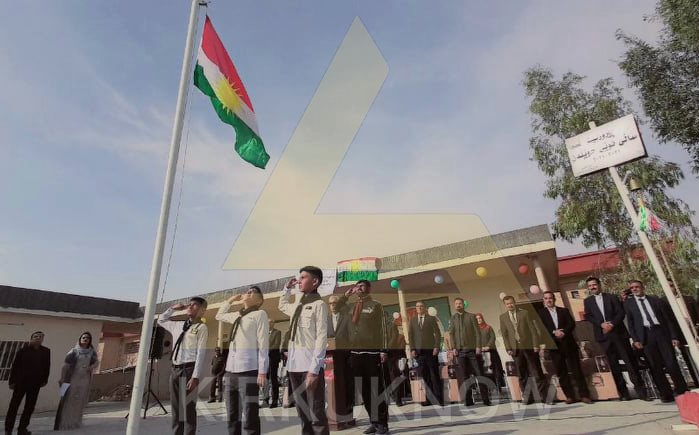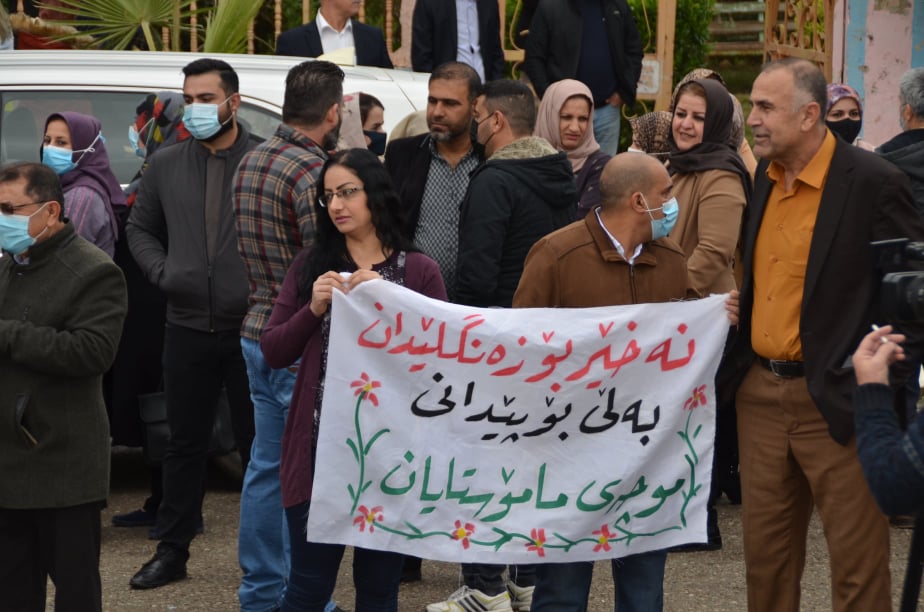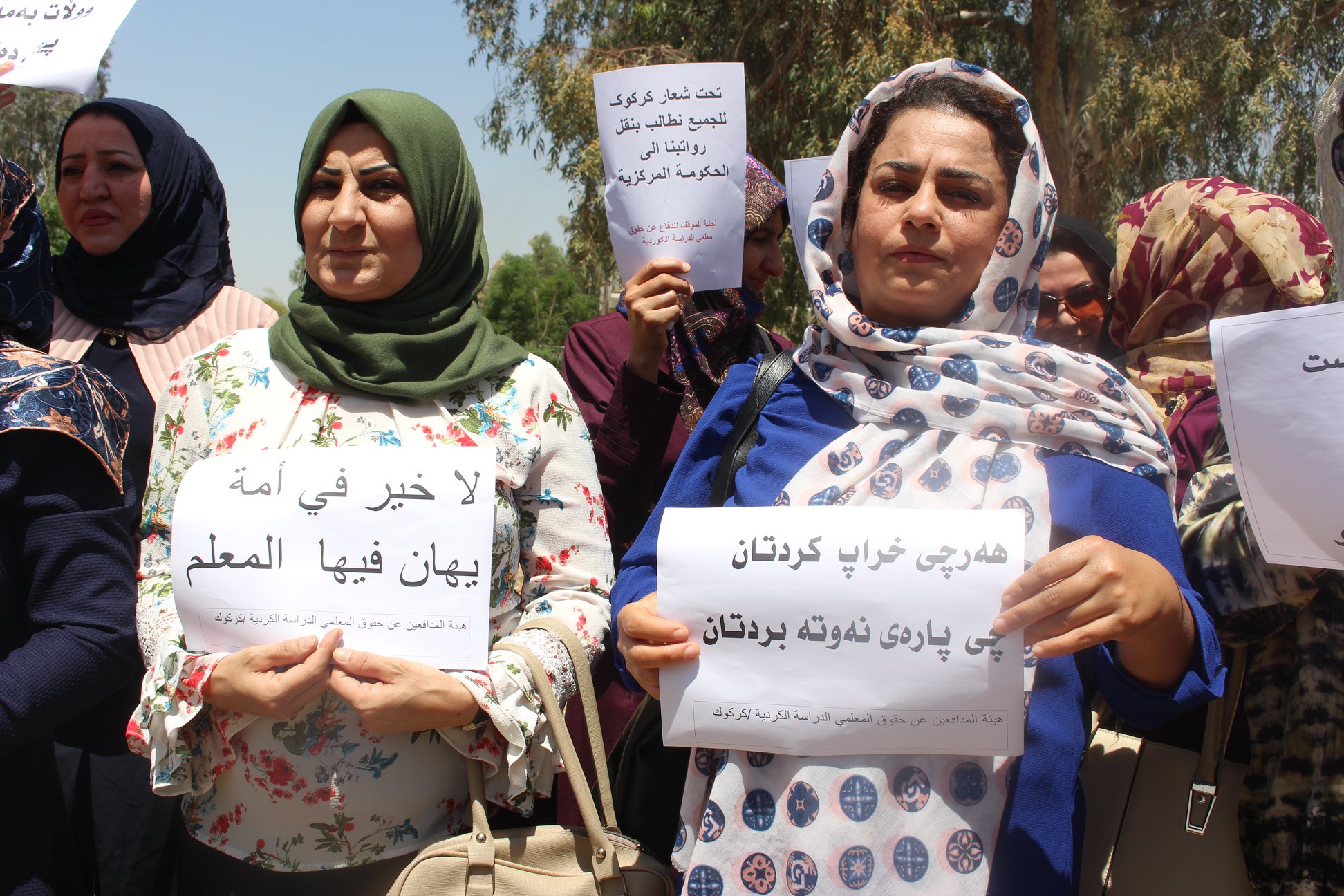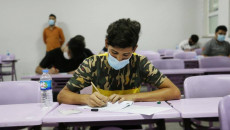Ashti Abdullah took to the streets and demonstrated for several years to be paid by Baghdad than Erbil, a dream has almost turned a reality; The transfer of their salaries and services from the Kurdistan Regional Government KRG to the Iraqi Federal Government is in the final stages.
Abdullah, 31, is a teacher in a Kurdish school in Kirkuk. Some of their affairs such as annual plan and lessons are with the Iraqi Ministry of Education, but their salaries are still paid by the KRG.
“I would like our staff to be transferred to Baghdad, which is why I went to the streets and demonstrated several times, because if we belong to the Iraqi government, we will receive our salaries on time,” Ashti Abdullah told Kirkuk Now. He has served in Kirkuk for 10 years.
The KRG has been unable to pay the full salaries of its employees since 2014, on the grounds of the financial crisis.
Thousands of Kurdish teachers of Kurdish education in Kirkuk have staged dozens of protests over the past nine years demanding that their services be transferred to Baghdad.
Kurds in Kirkuk were happy for educating their kids their native language. The process was funded by the KRG which employed over 8,000 teachers which lamed in 2014 for irregular payment of monthly salaries and funding.
The tension between Baghdad and Erbil in 2017 had a negative impact on Kurdish education process in Kirkuk as the KRG was incapable of providing regular funding pushing the tutors for boycott and protest for several times.
There are no obstacles to the implementation of teacher transfers
In the agenda of the current Iraqi government headed by Mohammed Shia Sudani, an item (item 21 - page 25) is devoted to linking and transferring all schools outside the Iraqi Kurdistan Region IKR and their services (appointments) to the General Directorate of Kurdish Education under the Iraqi ministry of education.
Najwa Hamid Kakeyi, a member of the Education Committee of the Iraqi parliament, told KirkukNow that there are no obstacles to the transfer of teachers We will follow up on the process this week.”
She also explained that those whose services will be transferred, must be residents of the disputed territories, proven by citizenship, food ration forms and residence cards of their area.
"About 150 teachers in all the conflict areas have voluntarily requested that their salaries remain with the Kurdistan Regional Government and not transferred to Baghdad," she added.
The member of the education committee says some other measures remain; As for the pension issue, since the retirement age in Iraq is 60 years and in the IKR is 63 years, so “any Kurdish teachers and employees over 60 years old must retire immediately or remain on the region until they reach retirement age.”
Kurdish education unit in Kirkuk paid by the KRG are 7,751 teachers and employees teaching Kurdish curriculum to 100,000 pupils in 500 schools. The main language for education in Iraq is Arabic while in the three provinces of Kurdistan region it’s in Kurdish.
The KRG has opened special directorates for Kurdish education in the disputed territories of Kirkuk, Nineveh and Diyala which alike its Kurdish counterparts suffer lack of budget for accurate monthly payroll and shortage of staff, curriculums and utilities.
The oil rich city of Kirkuk, Iraq's second largest oil reserves, is ethnically a mixed province of Kurds, Sunni and Shiite Arabs, and Turkmen. It has long been at the center of disputes between Baghdad and the autonomous Kurdistan Regional Government KRG.

The two ministries of education in Baghdad and Erbil have formed separate committees in recent months to discuss the details of the implementation of the government's agenda item, which is related to the transfer of the Kurdish education service.
Karim Sayed, spokesman for the Iraqi Ministry of Education, told KirkukNow both sides have a special committee for this purpose, there is coordination and there have been visits to discuss the details of the process, which includes information and data.
“They will announce new decisions whenever they are made.”
Kurdish education began in 2003 after the fall of the Ba'ath regime in Kirkuk and other disputed areas.
Sherzad Rashid, director of Kurdish education in Kirkuk, said they have completed all the procedures with Baghdad, including providing all the information on teachers, equipment and schools.
"We have handed over everything to the Iraqi Ministry of Education and waiting for them or rather, we are waiting for the decision of the Iraqi Council of Ministers.”
Rashid is not aware of the steps taken by Baghdad to implement the government's agenda and transfer the service of Kurdish teachers, "As far as we know, there are no obstacles to its implementation.
“We asked the Kurdistan Regional Government to set the entire curriculum, but they say it must belong to the Iraqi government. Then we agreed that scientific subjects such as chemistry, physics and mathematics should be set by the Iraqi government."
We have submitted everything to the Iraqi Ministry of Education and are waiting for their response
Kurdish Education of Kirkuk and the disputed territories receive their curriculum and system from the KRG, but their work and exams are organized by Baghdad.
The director of Kurdish education in Kirkuk says the issue of the difference in retirement age should also be resolved between the two governments.
Rashid said the salaries of teachers in the Kurdistan Region and Baghdad are the same. "There were attempts to transfer the services to Baghdad in 2009 and 2010, but very few people were willing to transfer their services.”
There are 7,425 teachers and employees in Kurdish education in Kirkuk, with more than 1,000 temporary lecturers.
“I and all the teachers of my school agree and demand that our posts be transferred to the Baghdad government because the salaries will not be delayed and their pensions will be higher,” Jawana Aasi, a teacher in a Kurdish school of Kirkuk, told KirkukNow.
“We are stuck between two educations, nothing can be done for us,” said Aasi, a 60-year-old mother of four children, has served for 20 years.

Iraq operates under the Unified Pension Law No. 9 of 2014, but the Kurdistan Region operates under the Pension Law No. 27 of 2006, which has been repealed in Iraq.
Parwin Fatih, director of the Kurdish Education Supervision Unit in the Kirkuk Education Directorate, said all procedures for the transfer of services have been completed and they are waiting for the approval of the Iraqi budget.
The Iraqi budget bill is in parliament and has not yet been endorsed.
"Item 21 of the Iraqi government's agenda has been done well and all parties agree on the implementation of the agenda," Parwin told Kirkuk Now.
“We are trying to find a solution for teachers born in 1961, 1962 and 1963.”
In the Kurdistan Region, unlike Baghdad, there is no teachers' pension fund and the amount of money deducted from salaries is directly mixed with the state budget and expenditures.
I and all the teachers of my school agree and demand that our posts be transferred to the Baghdad government
"We do not have a pension in the pension fund, so we are paid a small amount of money when we retire, unlike Baghdad, which is a big difference between the pensions of the two governments.”
Parvin gives an example of the difference in pensions between the two sides; If a pensioner of the Iraqi government has 42 years of service, he will receive a salary of 1.5 million Iraqi dinars IQD ($1,000), with an allowance called the burden of life of about 300,000 IQD, in addition to retirement compensation of 30 million IQD while the same teacher gets a monthly salary of 900,000 IQD and the retirement compensation is only 10 million IQD.
The director of the Kurdish Education Supervision Unit said the guidelines so far are only for the transfer of permanent employees, not contract-based teachers and employees.
In addition to Kirkuk, there is Kurdish education in other disputed territories, with about 17,000 teachers and employees.
Kamran Ali Hassan, director of the supervisory unit of Kurdish high schools in Kirkuk, told KirkukNaw: “There are two sides to the transfer of teachers: One is positive in terms of affecting daily life of teachers and the second is negative in terms of education in Kurdish," without giving further details.
Saman Siwayli, spokesman for the Kurdistan Regional Government (KRG) Education Ministry, declined to comment on the case, saying the details of the case are with the director of Kurdish education in Kirkuk.






